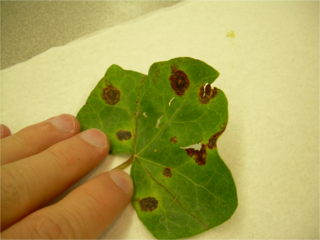
The Xanthomonadales are a bacterial order within the Gammaproteobacteria. They are one of the largest groups of bacterial phytopathogens, harbouring species such as Xanthomonas citri, Xanthomonas euvesicatoria, Xanthomonas oryzae and Xylella fastidiosa. These bacteria affect agriculturally important plants including tomatoes, bananas, citrus plants, rice, and coffee. Many species within the order are also human pathogens. Species within the genus Stenotrophomonas are multidrug resistant opportunistic pathogens that are responsible for nosocomial infections in immunodeficient patients.
The Alicyclobacillaceae are a family of Gram-positive bacteria. All members of this family are aerobic and form endospores.
Intrasporangiaceae is an actinomycete family. The family is named after the type genus Intrasporangium. The type species of Intrasporangium was originally thought to form endospores; however, the mycelium of this strain may bear intercalary vesicles that were originally identified as spores. No members of Intrasporangiaceae are known to form spores.
Desulfosporosinus is a genus of strictly anaerobic, sulfate-reducing bacteria, often found in soil.
Sulfobacillus acidophilus is a species of moderately thermophilic mineral-sulphide-oxidizing bacteria. It is Gram-positive, acidophilic and ferrous-iron-oxidising as well.
Pedobacter lentus is a species of Gram-negative, non-motile, pleomorphic bacteria. Its type strain is DS-40(T).

"Syntrophothermus lipocalidus" is a bacterium, the type species and only currently described species in its genus. It is thermophilic, syntrophic, fatty-acid-oxidizing and anaerobic, and utilises isobutyrate. TGB-C1T is its type strain. Its genome has been fully sequenced.

Kytococcus sedentarius is a marine dwelling Gram positive bacterium in the genus Kytococcus. It is known for the production of polyketide antibiotics as well as for its role as an opportunistic pathogen. It is strictly aerobic and can only grow when amino acids are provided.
Desulfurobacterium thermolithotrophum is a species of autotrophic, sulphur-reducing bacterium isolated from a deep-sea hydrothermal vent. It is the type species of its genus, being thermophilic, anaerobic, Gram-negative, motile and rod-shaped, with type strain BSAT.
Microvirga lotononidis is a nitrogen fixing, Gram-negative, rod-shaped and non-spore-forming root-nodule bacteria from the genus of Microvirga. Microvirga lotononidis lives in symbiosis with Listia angolensis.
Desulfohalobium is a Gram negative, anaerobic, sulfate-reducing, moderately halophilic and rod-shaped bacterial genus from the family of Desulfovibrionaceae.
Ruth Evelyn Gordon (1910–2003) was an American bacterial taxonomist. She was member of the American Type Culture Collection. The bacterial genus Gordonia and species Mycobacterium gordonae are named after her.
Leadbetterella is a Gram-negative and strictly aerobic bacterial genus from the family of Spirsomaceae, with one known species.
Runella is a Gram-negative, aerobic and non-motile bacterial genus from the family Spirosomaceae.
Paludibacter is a Gram-negative, strictly anaerobic, chemoorganotrophic and non-motile genus from the phylum Bacteroidota.
Conexibacter is a Gram-positive, non-spore-forming and aerobic genus of bacteria from the family Conexibacteraceae.
Olsenella is a Gram-positive, non-spore-forming, obligate anaerobic and non-motile bacterial genus from the family Atopobiaceae. Olsenella is named after the microbiologist Ingar Olsen. Olsenella bacteria are involved in endodontic infections in humans.
Aminobacterium colombiense is a Gram-negative, mesophilic, strictly anaerobic and non-spore-forming bacterium from the genus of Aminobacterium which has been isolated from anaerobic lagoon from a dairy wastewater treatment plant in Colombia.
Kyrpidia is a genus of Gram-positive, rod-shaped, thermophilic, spore-forming bacteria.
Intrasporangium is a genus of Gram positive, nonmotile bacteria. The genus name refers to the mycelium of the type strain forming intercalary vesicles that were originally identified as spores. However, no spores have been observed in later studies. The family Intrasporangiaceae is named after the genus, and Intrasporangium is the type genus for the family.


